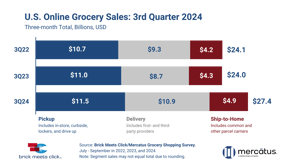CONVENTIONAL BEHAVIOR
During all the excitement earlier this month with earthquakes, profoundly cold weather and, of course, the big meeting of executives in Boca Raton, Fla., one of the more significant industry developments to come along in a while may have passed unremarked. That development -- actually more of a slowly building theory -- is that the more Wal-Mart Stores heads into food retailing, the more it begins
January 31, 1994
David Merrefield
During all the excitement earlier this month with earthquakes, profoundly cold weather and, of course, the big meeting of executives in Boca Raton, Fla., one of the more significant industry developments to come along in a while may have passed unremarked. That development -- actually more of a slowly building theory -- is that the more Wal-Mart Stores heads into food retailing, the more it begins to procure its products like a conventional food retailer. One of the most recent and compelling bits of evidence that would support this theory saw print in SN's issue of Jan. 17.
In a Page 1 article, Charles Anderer wrote that Wal-Mart, through its Sam's Club operation, was demanding what amounts to slotting allowances from food suppliers in exchange for the right to supply products to the membership clubs Wal-Mart acquired late last year. Charles, by the way, is editor of Club News, one of the SN Group of publications.
The clubs at issue in the slotting-allowance development are the 93 former Pace Membership Warehouse locations Wal-Mart bought from rival Kmart, 87 of which have been rebannered as Sam's. What's interesting is that evidently even vendors who supplied products to those same units when they were under the ownership of Kmart have been asked for the pay-to-stay bucks. It should be acknowledged that in a few instances when conventional food retailers changed ownership, similar pay-to-stay plans surfaced. Anyway, Wal-Mart's demand for payment, assuming it bears the expected fruit, will be no small potatoes: Some vendors are being asked to cough up as much as $600 per stockkeeping unit. It's understood the exact amount is open to negotiation.
Nonetheless, Wal-Mart may be able to generate a cash stream from vendors that will help underwrite a significant amount of the price it paid Kmart for the Pace units, a sum estimated to be in the region of about $300 million. "This is a huge departure from Wal-Mart's usual practice of net pricing," one trade observer allowed. "Unfortunately, the precedent has been set in retail grocery."
As is generally the case, publicity-shy Wal-Mart declined to comment on the development. Meanwhile, several trade observers have told me that the situation at Sam's is by no means the only way Wal-Mart's buying practices concerning food products are quite different from those that prevail on its nonfood side. Nonfood buying strategies are generally driven by the strict dead-net approach while, when it comes to food buying, many of the traditional promotional practices the conventional industry is beginning to brand as inefficient are being milked. One observer told me lately that suppliers who proffer products by way of the buying apparatus set up for the food-driven Wal-Mart Supercenters -- and also through the buying offices for the discount stores -- find the playing field completely different.
That phenomenon may increase as Wal-Mart gets into food buying for the Supercenters in a bigger way and as it trims the number of food SKUs channeled to its conventional discount stores, as appears to be the case. And this food buying could get to be a big business for Wal-Mart. It now has about 70 Supercenters and plans to convert 75 or 80 conventional locations to the format this year and build five or 10 Supercenters from the ground up. Assuming these situations are all about correct, it presents a scenario rich with irony. After all, the conventional retail-grocery industry is deep in the throes of figuring out how to operate more efficiently -- a strategy that includes purging many current promotional practices. And the conventional industry is being spurred to such action in no small measure by the perception that Wal-Mart won't indulge in anti-efficient practices such as forward buying, slotting allowances and the like.
About the Author
You May Also Like




